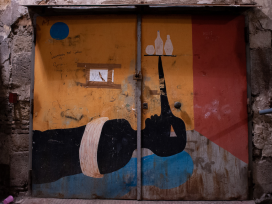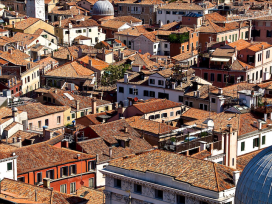On 14 December 2010, as Prime Minister Silvio Berlusconi was narrowly surviving a vote of confidence in parliament that will keep his government breathing for another few months, the streets of Rome were witnessing riots on a scale unseen since the end of the 1970s. While the interior minister and other prominent figures were discrediting the demonstration on the basis of the violence of a minority of demonstrators, Berlusconi himself was busy attacking the press for its coverage of the demonstrations and of recent events that had caused his once solid parliament majority to shrink to a mere three votes. An unusual approach for the Prime Minister of a European country to take, one might think. So what is going on in Italy?
If we are looking for an insight into the cultural and political landscape of a country, then its media is as good a place as any to start. The growing concentration of ownership in television, now evident globally, is something Italy has known for longer than most. Its impact on Italian society is increasingly evident. Yet below the surface of what many see as Italy’s present slippery slope, the press is undergoing a revival. While the newspaper industry worldwide is losing power and money, in Italy its influence is on the rise. From the bitterness of Berlusconi’s accusations against Italy’s newspapers, it is evident that the government is worried.
One indicator of the renewed strength of Italian print media is the vigorous surge in investigative journalism. While media pundits in other countries lament the death of journalism, in Italy journalists have been taking the lead in exposing Berlusconi. For some time now, Il Cavaliere has been accusing newspapers such as La Repubblica of “terrorist attitudes” and “subversive designs”, language similar to that being used by some world leaders against Wikileaks.
The main media problem in Italy today revolves around ownership of its various television stations. According to the Nielsen Media Annual Report for 2010, ownership in Italy is four times more concentrated than in other countries in western Europe. It is compounded by the conflict of interests between the public broadcaster RAI, with a 43 per cent audience share, and the dominant private sector media empire, Mediaset. Exercising total control of both is Silvio Berlusconi and his cronies. No discussion of the media situation in Italy can avoid the problem posed by the conflict of interests between Berlusconi the Prime Minister and Berlusconi the owner of the largest publishing company in Italy and of a TV group that commands a 40 per cent share of the national audience.
This is one aspect of a wider history of a weak media, itself the result of the monolithic structure of post-war politics, where one party governed for over 50 years. Constant and overwhelming political pressure on state broadcasting came to be seen as the norm: information was viewed more as a political bargaining chip than a potential scoop. Before the recent exposés of the prime minister’s escapades allegedly involving underage girls, the last successful press campaign against a prominent politician dates to 1976, when the president at the time, Giovanni Leone, was accused of involvement in the Lockheed bribery scandal.
What has characterized the Italian media situation for the past 20 years can now be observed in much of the rest of the world. Concentration of ownership and the impotence of the press have become common, as evidenced by the rise of a number of major media groups in Europe, most notably Rupert Murdoch’s News Corporation. For a newspaper industry, particularly that in the US, just recovering from the loss of credibility after the war in Iraq, the economic crisis has inflicted what at times seemed a near-mortal blow.
Media concentration in Italy threatens media plurality and independence, government accountability and the future of democracy itself. As the filmmaker Erik Gandini says, the problem with Italians is that they have been living too long in Berlusconi’s image, in a world where respect for the law and national institutions is low, and, most importantly, where there is little or no respect for women. As people took their anger onto the streets in December, “rebel” MPs were running back to Berlusconi, allegedly thanks to a bargaining process more about money than principles. If ordinary Italians have woken up from this dangerous dream, the political class is still fast asleep.
“Give us back our reality!”
There is a notable discrepancy in the penetration of the press in Italy compared to other major European countries: 40 per cent in Italy, 60 per cent in Europe. Television penetration is 80 per cent throughout the continent. News will not reach the majority of the population unless it makes it onto television. Since nothing of a controversial or critical nature gets as far as the government-controlled TV stations or Berlusconi’s outfit, government politicians and national institutions are not held to account for issues raised only in the press. While the press is freer and more informative than television, without the amplifier effect of the latter its influence is severely circumscribed. This explains why so many Italian politicians have escaped with impunity what in most countries in Europe would be seen as incontrovertible charges of corruption.
Italians are well aware of this phenomenon: in July 2010, a huge demonstration attracting 200,000 people took place in Rome, organized by people from the L’Aquila, the province devastated by a major earthquake the year before. Who, or what, was the target of the demonstrators’ sharpest criticism? Not the lack of financial help by the government, nor the network of corruption that saw millions of euros going to ruthless entrepreneurs, while survivors were not allowed back into their houses and funds for temporary housing ran out in the aftermath of the tragedy. “Give us back our TV! Give us back our reality!” was one of the most popular slogans. In the opinion of the citizens of L’Aquila, the state TV channel RAI was guilty of misleading the public on conditions in what, a year later, remains a ghost city. L’Aquila’s “reconstruction” is portrayed by RAI as a government success story. The story told by newspapers is quite different, but the people of l’Aquila know that in order to get the facts out to the rest of the country, their story needs to be reported on television.
The power of a vertically integrated media was made evident this summer by the press campaign orchestrated against Berlusconi’s onetime ally Gianfranco Fini, head of the centre-right Future and Freedom Party, by the two newspapers close to Berlusconi, Il Giornale and Libero. The campaign started on 29 July, one day after Fini’s declaration that he would leave the coalition. Although supported by shaky evidence, the accusation that he was guilty of stealing property from his own party caused Fini some sleepless nights. Everybody in Italy was talking about this “crime”. Why? Because when the TV sides with the press, the news turns from speculation to fact. Needless to say, Berlusconi’s television stations gave ample coverage to the allegations.
Italy has a lively press with many national dailies across the political and ideological spectrum, and many local and regional newspapers. Their number and quality ensures that key issues are treated at length and in depth, while scandals and injustices do make the front pages of the mainstream press. But without television’s stamp of credibility, such scandals can be dismissed as mere rumour or as politically motivated attacks. This can turn into a time-wasting vicious cycle, since in order not to become completely detached from the reality portrayed by television, the press needs to cover the opinions of politicians involved. As a result, the pages dedicated to Italian politics are taken up with accusations and counter-accusations, with little attention given to the discovery of the facts or what went on in parliament the day before. It is as though editors follow the advice of author and investigative journalist Marco Travaglio, an unusual rightwing anti-Berlusconi journalist: “abolish fact in order not to disturb opinions.” In such a scenario, journalism risks becoming more about narrative than news.
The cycle is reinforced by the well-known lack of transparency in Italian institutions, which makes it hard, even for professional journalists, to obtain reliable information about the activities of the government and state institutions (such as the police), as well as about crucial sectors of the economy. A clear illustration of this is provided by recent statements by the foreign affairs minister Franco Frattini on the Wikileaks debate, as reported by leading Italian newspapers: “There are things that can be reported by the press, others that cannot because of their confidential nature.” His view makes sense until we realize that a lot of news in the public interest is suppressed thanks to this “confidentiality” clause.
An easy but underreported example is the national security seal imposed by the government around waste incinerators recently built in the Naples region, following the “waste crisis” that had caused garbage to pile up on the streets. Thanks to a spurious government emergency decree, the areas in which these new plants operate falls under army control; neither the media nor community representatives may enter. Just as it is obvious that there is no national security issue at stake, it is obvious that the efficiency and hygiene of these plants is a critical issue for local residents, who already suffer the effects of illegal landfills for toxic waste in the region. Persistent rumours about the malfunctioning and dangerous leakage of one of these incinerators only highlights the problem.
The press rides to the rescue
Following the revelation in 2008 of dangerous levels of national debt, the government axed funds from newspapers and other cultural publications and organizations – the latter already having undergone major cuts during the first Berlusconi government from 2001 to 2006. Demonstrations against these cuts by both the media and the cultural world have been frequent in recent years; they were blamed for the collapse of a major structure in the ancient Roman city of Pompei towards the end of 2010. But what chiefly concerns the press is that the measures reinforce government control over the media: the cuts are accompanied by a stipulation that funding will be reconfirmed annually, rather than, as in the past, every five years. This makes it hard for publications to access private credit, causing them to be increasingly dependent on government whim and therefore less likely to criticize the government and its agencies.
What is the point of this if the press is redundant? One advantage of the homogenization of the TV market around a pro-government position is that if one wishes to know what is really happening, one has to turn to a different source. And the most common of these remains the press. Despite the economic crisis taking its toll on a country that has been bogged down in economic stagnation for the past decade, the press has gained momentum in the past two years. With the stories on offer it could hardly go wrong: they ran the gamut from sex scandals to mafia connections and allegations of corruption against prominent politicians; from protests from the roofs of factories threatened with closure to the mountains of garbage piling up in the street of Naples. The most recent sex scandals of November 2010 involved a runaway from a state-run home for children with problems. Then there is the macho folksy ritual known as Bunga-Bunga – the most searched term in Google Italy, and according to Berlusconi himself a name suggested by his good friend Colonel Gaddafi.
Despite his grip on the flow of TV information, Berlusconi is finding it hard to stem the flow of these spicy details and keep his popularity above the bar of its all time low. His allies are struggling to defend him in front of their voters, already strained by the economic crisis. The press is warming to its new role as a major player in Italy’s ongoing political and social unrest, while the public, used to the impotence of press campaigns and the banality of televised news, is enjoying the novelty.
With the editorial group of the national daily La Repubblica – a member of the Espresso Group owned by Berlusconi’s former arch business rival Carlo De Benedetti – leading the way, virulent and persistent campaigns have been brought against government officials, with one prominent minister forced to resign in 2010 and the PM himself facing a steep downturn in popularity. Marco Travaglio has started his own newspaper, Il Fatto Quotidiano (The Daily Fact), a useful tool for those who want to discover the facts behind the opinions. Il Fatto is in the process of building a campaign against the President of the Senate, Renato Schifani, second in power only to the Prime Minister, who has for many years been the lawyer of one of the most important Mafia families in Sicily. It is a lonely road.
Unlike virtually every newspaper in the world, and despite government cuts aimed at the press, La Repubblica and others have seen a sustained rise in sales. But there is more to it. At a national meeting for young entrepreneurs in June 2009, just one month after the sex-scandals surrounding him had started to emerge in La Repubblica, Berlusconi bluntly asked the audience to “stop buying advertising space in those newspapers that damage the reputation of Italy” and its institutions. This desperate call gives us a measure of the re-acquired power of the press.
The threat from outside
The more Berlusconi’s own media and RAI side with the government, the more Berlusconi’s empire is threatened by competitors, both external – in particular Murdoch’s Sky TV – and internal. These are free to discuss issues that are taboo for Berlusconi’s media, and do so at length. In the process, they increase their audience share by stealing from the master. RAI’s few “dissident” shows all perform better than any other political shows on Italian TV. Gomorrah author Roberto Saviano’s “Vieni via con me”, for instance, scores a record 30 per cent audience share, by far the best ever share for RAI 3, which usually hovers around 10 per cent. Despite this, RAI executives have been deaf to the calls of Saviano and the public to extend the show’s initial four-week run.
The reasons are not hard to find: using evidence from pending trials, Saviano charged Berlusconi’s key ally, the Northern League, with covering up the comprehensive Mafia infiltration of the legal system of the Milan area. Interior minister Roberto Maroni strongly protested, and, at the time of writing, is expected to answer questions posed by Saviano in what will be the final episode. As a reward for this unprecedented broadcasting success, the government-elected RAI board froze the salary of the manager of the show for the foreseeable future.
It should also be borne in mind that La Repubblica‘s revelations on the sex scandals involving Berlusconi started to emerge only one month after Sky TV had overtaken Mediaset’s advertising revenues for the first time. The virulent media campaign against Berlusconi took advantage of the relative weakness of his media empire – despite the fact that RAI and Mediaset still control 80 per cent of the audience share.
Throughout history, Italy has been at the forefront in developing new systems of governance – fascism, for instance. The new politico-media complex is no exception: in the new, spectacle-driven politics, and in the concentration of the media in the hands of a few, Italy once again leads the way. Yet despite the present system’s obvious dangers – “Berlusconismo” and its effects will outlive the man, as opposition leader Nichi Vendola has said – the press has re-discovered its traditional role: to speak truth to power. Efforts to overcome its financial difficulties are imperative. It is only the existence of a strong and independent press that will ensure the survival of democratic institutions and of government accountability. And as the Wikileaks debate reminds us, an independent press is what an otherwise endangered sovereignty of the people over their elected representatives depends on.






